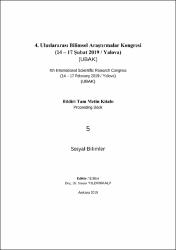J. Bentham'ın toplum sözleşmesi ve doğal haklar eleştirisi
Citation
KAYA Mustafa (2019). Jeremy Bentham’ın Toplum Sözlesmesi ve Dogal Haklar Elestirisi. 4.Uluslararası Bilimsel Arastırmalar Kongresi, 197-210Abstract
Jeremy Bentham (1748-1832), Antik Yunan felsefesinde Aristip-pos ve Epikuros gibi filozoflar tarafından öne sürülen hazcı etiği, fayda ilkesi bağlamında yeniden yorumlayıp çağdaş bir etik ve hukuk teorisi geliştirmeyi başarmış bir 19. yüzyıl filozofudur. Fayda ilkesi, ahlak alanında bireyler arası ilişkileri düzenleyen, hukuk alanında ise yasa koyucunun eylemlerinin ve ya-saların düzenlenmesinde kullanılacak nihai ilkedir. Bentham'ın ahlak felsefe-sinde, fayda ilkesi haz peşinde koşan insanlar arasında çıkacak çatışmayı son-landıran, birey ile toplum arasında köprü kuracak bir ilke olarak görülür. Fayda ilkesiyle bireyin faydası ve iyiliğinden toplumun faydası ve iyiliğine geçilir. Ahlakta olduğu gibi hukukta da fayda ilkesinden hareket eden Bentham'a göre, egemenin iradesi olan hukuk, toplumun mutluluğunu artıracak faydalı yasalar yapmakla yükümlüdür. Çünkü insanların devlete itaati, sağladığı faydadan ge-lir. Bentham, toplum sözleşmesi geleneğinde yer alan Hobbes ve Locke gibi düşünürlerin ifade ettiği şekilde, varsayımsal bir toplum sözleşmesiyle sivil toplumun ve devletin ortaya çıkışının açıklanamayacağını ifade eder. Bu bağ-lamda Bentham hukuk teorisinde, hem toplumsal sözleşme teorilerine hem de doğal hukuk anlayışına karşı eleştiriler getirmiştir. Jeremy Bentham (1748-1832) was a 19th-century philosopher who, in Ancient Greek philosophy, succeeded in re-interpreting the hedonist ethics put forward by philosophers such as Aristippos and Epicurus in the
context of the principle of benefit and developing a contemporary theory of
ethics and law.The principle of utility is the ultimate principle that regulates
inter-individual relations in the field of morality, and in the field of law will be
used to regulate the acts and laws of the legislator. In Bentham's moral philosophy, the principle of utility is seen as a principle that ends a conflict between
the people who seek pleasure, and to bridge the gap between the individual and
society. With the principle of utility, the benefits and benefits of the individual are passed to the benefit and good of the society. According to Bentham, who
acts on the principle of utility in law as well as in morality, the sovereign law,
which is the will of the sovereign, is obliged to put in place useful laws to increase the happiness of the society. Because people's obedience to the state comes from the benefits it provides. The emergence of civil society and the state
cannot be explained by a hypothetical society convention as it is in the tradition
of society contracted by thinkers such as Hobbes and Locke. In this context,
Bentham has criticized the theory of law and the theory of natural law.



















